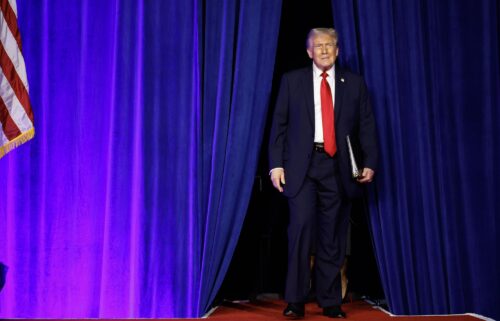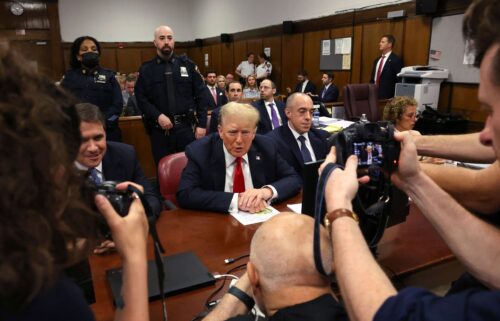Biden’s relationship with Manchin hits a low point, even as they clear the air

By Kevin Liptak and Jeff Zeleny, CNN
After months of careful cultivation — and even a nickname — the most important relationship in Washington is narrowly weathering its stormiest moment to date.
“The Two Joes” — President Joe Biden and Sen. Joe Manchin — spoke by phone on Sunday evening after their tenuous alliance blew apart earlier that morning, imperiling the President’s domestic agenda and leaving the fate of his legislative ambitions uncertain.
From his home in Delaware, the President discussed reengaging Manchin on his sweeping spending plan next year, sources familiar with the call said. It was cordial and a chance to clear the air. But few assurances were provided that offered confidence of a path forward.
And even amid the air-clearing, the slights — real and perceived — seemed to be piling up.
Manchin complained Monday to a radio station in his home state of West Virginia that the process of negotiating a $1.75 trillion social and climate bill had become “so staff driven” and that he’d been pushed to his “wit’s end” by Biden’s aides.
A day earlier, Biden directed his team to essentially accuse the senator of deceit in a furious 714-word statement that Biden signed off on before it was sent.
Attempts by White House aides to reach Manchin before he went on the air to declare himself a “no” on Biden’s spending plan were futile. The only people Biden’s team heard from were Manchin’s staff.
The West Virginian was still nursing wounds after reading his name three times in a statement Biden released late last week explaining why the Build Back Better plan wouldn’t see passage this year, a breach of what he thought was an understanding to avoid finger-pointing to keep the talks afloat. A person who spoke with Manchin described him as “livid” for being singled out.
It was a remarkably swift deterioration for what had appeared, for most of the year, an amiable alliance that only periodically revealed its cracks. In talks inside the Oval Office and at Biden’s lakefront home in Delaware — an inner sanctum usually reserved only for family and close friends — Biden and Manchin had built a rapport that seemed the only way to unlock progress in an evenly split Senate.
Breaking apart at precisely the worst moment for Biden — as Covid-19 cases surge, Americans fret about the economy and Democrats prepare for a potentially demoralizing election year slog — the partnership with Manchin appears for now in a state of disrepair.
‘He was going back on his word’
Each man seemed to hint at the type of quiet resentments that usually accompany uneven partnerships built on necessity.
After Manchin’s surprise announcement, Biden and other White House aides felt it was important to “lay out exactly what had transpired,” one person familiar with the matter said.
“There were too many things where it felt like he was going back on his word,” the person went on.
Ultimately, the statement accused Manchin of “a sudden and inexplicable reversal in his position, and a breach of his commitments to the President and the Senator’s colleagues in the House and Senate.”
White House press secretary Jen Psaki, in whose name Sunday’s lengthy statement was issued, sought to bring the temperature down in her briefing a day later.
“I think the lengthy statement that I issued yesterday outlined pretty specifically the events of the last few weeks,” Psaki said, saying the tone of the statement was meant to make clear what had happened as negotiations dragged on.
“I will say, from the President’s viewpoint — and I saw him this morning — he’s working with Sen. Manchin over the course of decades,” Psaki went on.
“They share fundamental values. They’re longtime friends. That has not changed,” she said. “What’s most on the President’s mind is the risk of inaction.”
‘Absolutely inexcusable’
Manchin, meanwhile, appeared to still be stewing about Biden’s statement last week blaming him by name for delaying progress on the bill.
“This is not the President. This is staff. And they drove some things and they put some things out that were absolutely inexcusable. They know what it is and that’s it,” Manchin said cryptically during his Monday morning radio call-in, pointedly not saying what it was exactly that drove him off the edge.
In the end, a number of things seemed to be frustrating the West Virginia Democrat in the days before the plug was pulled.
The two men had spent much of the preceding week — and, ultimately, the past year — in communication over the contours of Biden’s proposed legislation. They had developed what officials described as warm relationship, even as Biden sometimes voiced frustration as the talks went on.
“Joe, at the end, has always been there. He’s always been with me,” Biden said at the end of September at another critical juncture for his domestic agenda.
The outsized role that centrist senators such as Manchin play have earned them both the attention — and, in some instances, the private ire — of White House officials, who are loathe to appear beholden to a small group of lawmakers but have almost no room for error on close votes.
The rules of the Senate have always allowed any individual senator to slow down a nomination, but the dynamics of a 50-50 split in the chamber have given Manchin — along with a handful of other moderates willing to break with their party — even more power in determining the fate of a nomination or a piece of legislation.
A delicate touch
In sessions at the White House, Manchin and Biden often meet in the Oval Office, sitting opposite each other in front of the fireplace where the President typically receives foreign dignitaries.
Four days before Biden was set to depart for high-stakes summits in Europe this fall, he invited Manchin to his home in Delaware to try and secure his agreement on a framework for the social spending plan, hoping to arrive to the Group of 20 and Glasgow climate talks with proof his agenda was on track.
At one point, the President even walked the senator through his lakefront house to show him around.
Earlier this year, as Biden’s first major legislative initiative, a $1.9 trillion Covid-19 relief package, neared a final vote in the Senate, Manchin felt blindsided by an agreement Democrats reached to make some jobless benefits tax-free. He balked, stalling the bill’s progress for hours.
After being lobbied by several of his Senate colleagues, Manchin ultimately received a phone call from Biden, who aides said was deliberately careful not to add pressure to the situation.
Instead, the President chose to give Manchin space, listening to his concerns while underscoring the importance of passing the bill, a source with knowledge of the discussion said. Manchin, two sources said, was urged by the President to do what he thought was right — in essence, to vote his conscience.
Biden, who served for 35 years in the Senate, is cognizant that Manchin is his own senator and doesn’t take kindly to being jammed, say people familiar with his approach.
The two men never served together on Capitol Hill and their relationship only goes back a decade. But people familiar with their dynamic say a sense of respect was forged during early phone calls then-Vice President Biden placed to Manchin after he was elected in 2010.
It was a devastating year for Democrats, with the party facing deep losses during the first midterm election of the Obama presidency. But Manchin was an exception, winning election and coming to the Senate eager to make deals — and be seen doing so.
He had little interest in talking to staff — even if they worked in the West Wing.
“(Biden) was the only one who called that mattered,” a person familiar with the dynamic between Manchin and Biden said, recalling the early days of the relationship between the senator and the former vice president. “Biden is the only person from the administration Manchin would listen to.”
More than a decade later, Manchin often infuriates Democrats on all sides of the party. But Biden knows well that without him, Democrats wouldn’t be in the majority at all.
The measured tone at the White House on Monday, which echoed throughout conversations with several administration officials, underscored a key point in the Biden-Manchin relationship: The President still needs the West Virginia senator if he hopes to get even part of his agenda approved in the new year.
The-CNN-Wire
™ & © 2021 Cable News Network, Inc., a WarnerMedia Company. All rights reserved.


